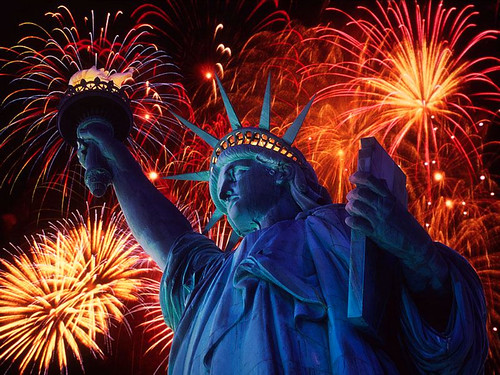AMERICA THE BEAUTIFUL

Roger Cohen offers another very sad and scary view.
via the NY Times.
November 8, 2010
An Unknown Soldier
By ROGER COHEN
HALIFAX, CANADA — The guy was sitting in the gloomy atrium of a hotel in Tampa, Florida. It was early morning, the plants were drooping and the lights mysteriously low — some kind of economy measure, perhaps. Anyway, he couldn’t see any of that. He was blind. And he had no right leg below the knee.
Terrible burns disfigured his arms and face. The right side of his head was concave, as if depressed by a savage blow. I tried to imagine the explosive force that had twisted his frame: a bomb in Iraq or an improvised explosive device near Kandahar, Afghanistan? There’s a big veterans’ hospital in Tampa.
I tried to imagine something else: how, by what medical ingenuity, this young man’s life had been saved; and how many thousands of other terribly injured Americans have survived the country’s 21st-century wars who would not have survived its 20th-century conflicts — and what toll this will take on the nation, over what period and in what form. Every so often America’s wounds are rendered raw; the faraway wars come home.
More often the hurt is like a dull ache. An employee of the University of South Florida drove me out to the airport. She told tales of middle-aged people out of work for two years, their houses underwater: casualties, these Florida folk, of the easy-credit binge that was the other face of a war-and-shop U.S. decade.
The usual airport scene: much-traveled pros huffing at the dilatory amateurs, harried people removing shoes and belts and laptops, sparring over trays like irritable kids, getting all the stuff lined up with production-line precision — only to find themselves thrust into one of the new full-body scanners that delivers an image of passengers in a state of near nakedness to some security official who, at whim, may order a repeat of the arms-raised, all-revealing little humiliation.
Philip Roth’s “indigenous American berserk” has gone into overdrive. It’s the new normal.
Is this right and forever? Security has become an all-devouring American God stiffened by righteousness, stripped of judgment, armed with technology. This deity knows no bounds, brooks no dissent. The threats are real — witness the cargo-plane bomb plot — but the right balance between security and freedom has been lost. I’m with Martin Broughton, the British Airways chairman who said recently that some security checks were “completely redundant.”
How immense is the hidden subsidy handed to America’s competitors by all this fear, with its trade-slowing, openness-defeating expressions? No doubt they could turn the lights up at that Tampa hotel if fear was turned down. Perhaps some unemployed 40-something people might find a job if goods weren’t being held up at the Canadian border.
I was headed to Halifax. Nova Scotians have the reputation of being the nicest of Canada’s nice people. I got proof of that when my flight was diverted to Prince Edward Island and a passenger from Canada’s forestry department rented a car and drove four of us for several hours through howling wind and rain to Halifax. This is not some Michael-Moore like paean to Canada, but still.
Several U.S. senators had gathered at the Halifax International Security Forum, an annual gathering that is the brainchild of Peter MacKay, Canada’s defense minister. One of them, Sen. Lindsey Graham, a South Carolina Republican, immediately put President Obama on notice.
Resurgent Republicans would be looking for him to “be tough with Iran beyond sanctions.” If it came to war, the United States should “sink their navy, destroy their air force and deliver a decisive blow to the Revolutionary Guard, in other words neuter that regime.”
Sure, Graham conceded, “you can expect, for a period of time, all hell to break loose.” Another war is the “last thing America wants.” But a nuclear-armed Iran was unacceptable and containment “off the table.”
This is dangerous talk from an influential Republican who sits on the Armed Services Committee. The United States, in its current depleted state, cannot afford another war in a Muslim country. It cannot find itself fighting across a 2,000-mile front stretching through Arab, Persian and Central Asian worlds. You could forget about the tenuous progress in Iraq and Afghanistan, where Iran can flick switches. From Lebanon to Gaza, on Israel’s borders, tensions would boil.
But Graham’s words were instructive. The pressure on Obama from Congress is going to grow. David Broder of the Washington Post even suggested recently that a war in Iran might spur the U.S. economy, just as World War II did.
The United States does not need the stimulus package from hell. This is a moment of great American uncertainty, a volatile passage. Sunni Pakistan has nukes and Al Qaeda. Shiite Iran has neither. It would be tragic to ignore the lessons of Iraq, stumble onto a war train armed with flimsy evidence, and imagine Iran is close to a bomb when there’s no conclusive evidence it’s made the decision to build one. Remember, the mullahs love ambiguity. It’s their element, along with maddening inertia. To risk “breakout” is to risk the Islamic Republic. Hence the waiting-for-Godot aspects of their nuclear zigzag.
When I heard those words — “neuter that regime” — what I saw was a shattered body in Tampa. A third U.S war is inconceivable.






No comments:
Post a Comment